A culinary master pushes the boundaries of Chinese cuisine in Seoul
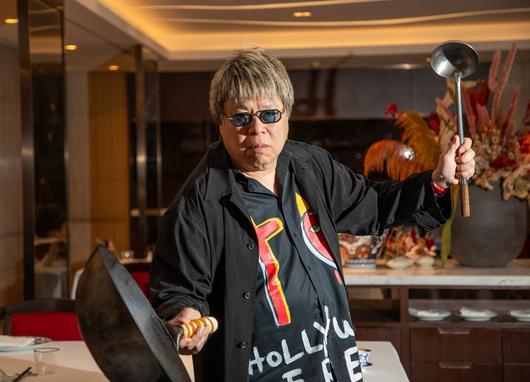 |
Alvin Leung, one of the world’s top chefs and a renowned judge on MasterChef Canada, visited Korea for a promotion with Wei Lou, a fine-dining Chinese restaurant located in the Grand InterContinental Seoul Parnas. The promotion runs from Oct. 5 to 13, 2024. /Choi In-won |
<이미지를 클릭하시면 크게 보실 수 있습니다> |
Here is a chef who calls himself a “demon.” His name is Alvin Leung, and if you have an interest in the culinary world, his name will likely ring a bell. While referring to oneself as a demon may sound provocative, the meaning he attaches to it is far from the evil connotations we often associate with the term.
The word “demon” is rooted in the ancient Greek term for “playful.” The “demon” Leung speaks of isn’t a figure opposing divine forces, but rather a reflection of his desire to bring imaginative joy to the table through the art of cooking.
His nickname is just as unforgettable as his first impression. With his signature dyed bob and blue sunglasses, it’s clear from the start that he’s anything but creative. Hailing from Hong Kong, Leung operates restaurants across the globe, from Bo Innovation, his Michelin two-starred flagship, to locations in Dubai, Singapore, and Canada.
Leung is also widely recognized as the pioneer of “X-treme Chinese” cuisine, a culinary genre that pushes boundaries with daring, experimental elements. His creations don’t merely reinterpret traditional Chinese dishes—they challenge conventions and ignite the imagination, utilizing modern techniques such as molecular gastronomy. For him, cooking is more than play—it’s a form of art to be elevated.
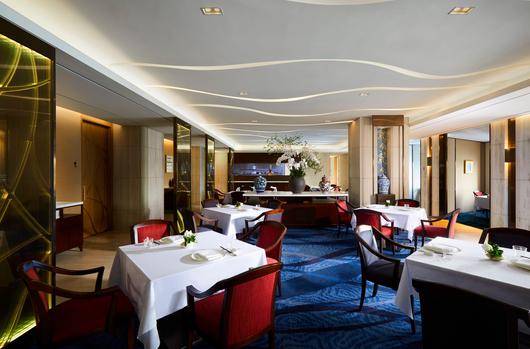 |
A view of Wei Lou. /Wei Lou |
<이미지를 클릭하시면 크게 보실 수 있습니다> |
However, fun isn’t the only thing he’s after. For his bold experiments to truly succeed, the core of every dish—flavor—must remain intact. To Leung, taste is the fine line that distinguishes true innovation from going too far.
Leung’s chose Wei Lou, as his latest “playground”. Wei Lou is perched on the 34th floor of the Grand InterContinental Seoul Parnas, offering sweeping views of Gangnam. When asked why he chose this location, he mentioned, “I wanted to cook at the best place.” It’s the perfect stage for him to prove his worth and take on new challenges.
From October 5 to 8, Leung showcased the essence of Chinese cuisine he has honed over the years, with a subtle nod to local Korean flavors. Finding iconic Korean ingredients like cockles, soy-marinated crabs, and hanwoo beef within his Chinese dishes adds a unique twist.
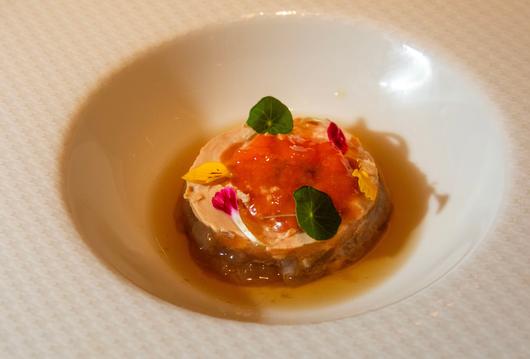 |
Foie gras soaked in Chinese yellow wine, topped with soy-marinated crab roe. /Wei Lou |
<이미지를 클릭하시면 크게 보실 수 있습니다> |
One standout dish is foie gras soaked in Chinese yellow wine, topped with soy-marinated crab roe. The rich creaminess of the foie gras immediately floods the palate, followed by the savory burst of the crab roe. Despite their strong profiles, the soy sauce and yellow wine leave only a delicate trace, balancing the dish’s bold flavors with a gentle finish. The combination of land and sea creates a richness that’s electrifying from the very first bite.
The hanwoo beef, served with black garlic, seaweed, and matsutake mushrooms, is another highlight. As the tender beef bursts with flavor, the seaweed adds a light wrap, while the black garlic softens the intensity of the meat’s aroma. The pickled pine mushrooms, with their concentrated fragrance, complement the mushroom purée beneath, perfectly capturing the essence of fall. After swallowing a bite, the earthy scent of pine mushrooms lingers in the mouth, leaving a lasting impression.
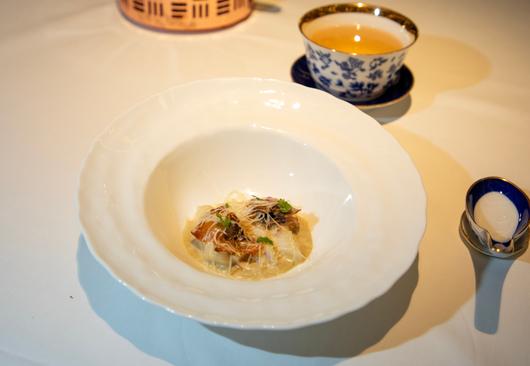 |
Rice cake and cockle mixed with Chinese fermented sauce. /Cho In-won |
<이미지를 클릭하시면 크게 보실 수 있습니다> |
— Could you briefly introduce yourself?
“My name is Alvin Leung, also known as the ‘Demon Chef.’ I started this journey simply because I love to eat. While many chefs say they were inspired by their mothers’ cooking, that wasn’t the case for me. Unfortunately, my mother’s cooking skills didn’t quite match the effort she put in (laughs). Instead of relying on others for inspiration, I taught myself, gradually learning to appreciate flavors. Currently, I run restaurants like the Michelin two-starred ‘Bo Innovation’ and ‘Demon Duck.’”
“It’s easy to associate the word ‘demon’ with something evil, but in this case, it has a different meaning. If you look at its origin, it goes back to ancient Greece, where ‘demon’ meant something playful. Personally, I believe anything is possible in cooking. Stories, concepts, and inspirations can all come to life through one’s imagination, which is why I chose this nickname. Ironically, the one rule I value the most is ‘there are no rules.’”
— Can you explain the concept of ‘X-treme Chinese’ cuisine?
”It’s about pushing things to the limit, but knowing where to draw the line. Think of it like bungee jumping: the act of jumping is thrilling because you’re testing your limits. However, if the safety cord is too short, you won’t experience the thrill properly, and if it’s too long, it could lead to disaster. Maintaining that fine balance is what maximizes excitement. Everyone has their own comfort zone, and it’s the same with taste. If you go beyond that line, people may not appreciate it. In short, ‘X-treme Chinese’ strives to reach the pinnacle of flavor while walking that delicate boundary.”
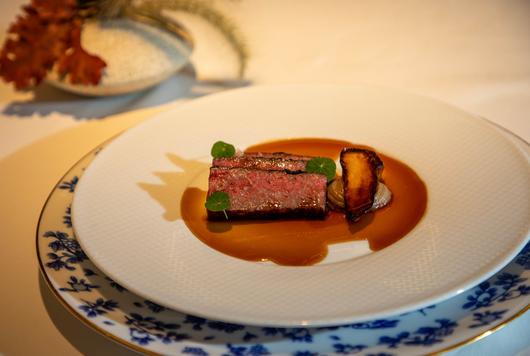 |
Hanwoo beef with pine mushrooms. /Cho In-won |
<이미지를 클릭하시면 크게 보실 수 있습니다> |
— What kind of dishes did you present at Wei Lou this time?
“Wei Lou is a fine-dining Chinese restaurant, so naturally, the focus was on Chinese cuisine. But I’ve also added elements that Koreans would enjoy. For example, one of the dishes I’ve specially created for this promotion is foie gras paired with soy-marinated crab roe. There’s also a dish that uses rice cakes and cockles. I wanted to showcase my own unique flavors that people haven’t experienced before. I’m confident these dishes can only be tasted at Wei Lou. You can expect something special.”
— What’s your take on Korean cuisine?
“I think it’s one of the most fascinating food cultures in the world. It’s both simple and complex at the same time. It covers temperature, texture, and taste in equal measure. Gochujang, soy sauce, and doenjang may seem simple at first glance, but their complex flavors can only be achieved through fermentation and aging. The fact that people here can even enjoy dishes like fermented skate (hongeo) shows that their palates are anything but ordinary. I’ve tried hongeo three times, and it’s still tough for me. The strong ammonia scent—people even enjoy that! In fact, I think many Koreans might have more refined palates than I do (laughs).”
“It’s one of the most luxurious hotels in South Korea. This isn’t just any InterContinental—it has ‘Grand’ in the name. The dedication and service of the Grand InterContinental Seoul Parnas team are impeccable. As you can tell, I have very high standards for excellence, and this place meets them. Since the hotel boasts top-tier service and facilities, I thought it’s now my turn to prove that my food can match that level. I love a good challenge.”
— How would you describe Alvin Leung as a judge, a chef, and in your daily life?
“Because of my strict standards on TV, many people think I’m scary. But in everyday life, I’m just like anyone else. I like what I like and dislike what I dislike—though my preferences might be a bit different from others. I enjoy playing squash and collecting Mickey Mouse watches. But as a judge, I need to be fair and objective. Judging is about right and wrong, and my personal preferences should never influence the evaluation. The same goes for being a chef. As a chef, it’s not about cooking for ‘my’ taste; it’s about making food that pleases the guests.”
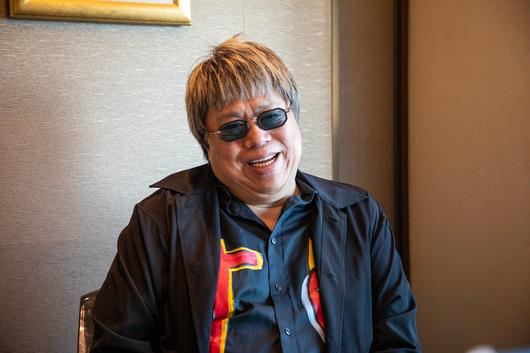 |
Alvin Leung, having an interview with The Chosun Daily. /Cho In-won |
<이미지를 클릭하시면 크게 보실 수 있습니다> |
— What do you consider most important in cooking?
“First and foremost, food must taste good. I always tell the others that ‘taste is king’. But you also have to pour your passion into each dish. Passion itself isn’t a guarantee of success, but without it, success is much harder to achieve. It was the same when I judged shows like ‘MasterChef Canada.’ If I ever got angry or pushed contestants, it was because they weren’t giving their best effort.”
— If you could compare your life to a dish or a restaurant, how would you describe it?
“I like to surprise people. If I had to express my life, it would be like a ‘blind restaurant’ where people taste the food blindfolded. There’s the anticipation before the food touches your lips, followed by the awe when you finally taste it. I want to offer that kind of unpredictable freshness. If I were to compare my life to a meal, I’d want it to be like a Christmas feast. The important things in life are the moments we celebrate with the people we love. But life isn’t always easy. It’s like trying to cook the perfect turkey on Christmas Day—not simple at all but also challenging. But sharing that turkey with your loved ones makes the whole process worthwhile. Looking back, I believe that’s the what life is all about.”
— It seems like there were many ups and downs on your journey to get where you are now.
“I’ve experienced a lot of failures in my life. There was even a time when I lost a Michelin star, going from three stars to two. But what I learned from those setbacks is how to rise again. Saying ‘I’ll never fail again’ is unrealistic and greedy. Life doesn’t work that way. What’s more important is learning how to recover faster and more effectively the next time you stumble. I will fail again in the future, but I’m not as afraid anymore because I know I can bounce back quicker.”
— Any final words for your readers in Korea?
“I’m thrilled to be back in Korea. I’ve seen how much Korean cuisine has evolved. Some restaurants are now so popular that it’s hard to even get a reservation—that’s a great sign. Korea is always a country I find intriguing. I hope to visit more often through exciting opportunities.”
[Lee Jung-soo]
- Copyrights ⓒ 조선일보 & chosun.com, 무단 전재 및 재배포 금지 -
이 기사의 카테고리는 언론사의 분류를 따릅니다.
언론사는 한 기사를 두 개 이상의 카테고리로 분류할 수 있습니다.


